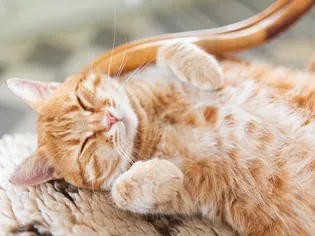Is My Cat Happy?
Updated on 05/27/24

Is My Cat Happy? The Ultimate Guide to Feline Well-being
In the tapestry of human-animal bonds, the enigmatic feline holds a special place. Their aloof nature and independent streak often leave us wondering - are our beloved companions truly content within our homes? Delving into the world of feline psychology, this comprehensive blog post will unveil the secrets to understanding your cat's level of happiness.
Assessing Feline Happiness: A Holistic Approach
Determining a cat's contentment requires a multifaceted approach that encompasses both physical and emotional well-being. While some signs of happiness are overt, others may be subtle and require keen observation. Here's a comprehensive checklist to guide your assessment:
Physical Health:
* Healthy weight: An overweight or underweight cat may experience discomfort and reduced energy levels.
* Shiny and well-groomed coat: A healthy cat takes pride in its appearance and regularly grooms itself.
* Clear eyes and nose: Respiratory infections and ocular issues can lead to discomfort and reduced well-being.
* Regular appetite and hydration: A cat that eats well and drinks plenty of water is typically healthy and happy.
* Normal litter box habits: Changes in litter box behavior, such as avoiding the box or defecating outside it, can indicate health issues or stress.
Environmental Factors:
* Safe and comfortable home: Cats need a safe haven where they can rest, sleep, and play without feeling threatened.
* Adequate space and vertical territory: Cats are territorial animals and require ample space to roam and explore. Vertical spaces, such as cat trees or shelves, provide a sense of security and enrichment.
* Scratching posts: Scratching is a natural behavior that helps cats mark their territory and relieve stress. Providing scratching surfaces prevents them from damaging furniture.
* Hiding places: Cats enjoy having quiet and secluded spots where they can retreat when they feel overwhelmed or stressed.
Behavioral Indicators:
* Playfulness: A happy cat will engage in regular play sessions, both on its own and with you.
* Affection: Cats show affection in various ways, such as rubbing against you, purring, or seeking cuddles.
* Exploration: Curious cats love to explore their surroundings and will often spend time investigating new areas or playing with toys.
* Positive body language: Relaxed body language, such as a raised tail or kneading, often indicates contentment.
* Absence of stress behaviors: Signs of stress, such as hiding, excessive grooming, or vocalizing, can indicate unhappiness.
Common Causes of Unhappiness in Cats
Understanding the potential causes of unhappiness in cats can help you address and improve their well-being. Some common factors include:
* Boredom: Cats need mental and physical stimulation to remain happy. A lack of enrichment activities can lead to boredom and restlessness.
* Stress: Stressors, such as loud noises, changes in routine, or the presence of other animals, can trigger anxiety and unhappiness in cats.
* Medical issues: Underlying health conditions, such as dental disease or arthritis, can cause discomfort and reduced happiness.
* Social isolation: Cats are social beings and require interaction with humans or other animals to thrive. Prolonged isolation can lead to loneliness and depression.
Enhancing Your Cat's Happiness: Practical Tips
Creating a happy and fulfilling life for your feline companion is within your reach. Here are some practical tips to help you enhance their well-being:
* Provide a stimulating environment: Offer a variety of toys, including interactive games and puzzle feeders, to keep your cat entertained.
* Engage in regular play sessions: Spend dedicated time each day playing with your cat to bond and provide mental stimulation.
* Create a safe and comfortable home: Establish a quiet and sheltered area for your cat to retreat to when needed.
* Respect your cat's boundaries: Understand your cat's body language and give them space when they need it.
* Offer companionship: If possible, consider getting a second cat or providing supervised interaction with other pets to address your cat's social needs.
* Seek professional help: If you have concerns about your cat's happiness or health, consult with a veterinarian or certified animal behaviorist.
Conclusion:
Understanding your cat's happiness is a journey that requires observation, empathy, and a commitment to providing a nurturing environment. By assessing their physical health, environmental factors, and behavioral indicators, and addressing potential causes of unhappiness, you can create a life filled with contentment for your beloved feline companion. Remember, a happy cat is a reflection of your love and care, strengthening the unbreakable bond you share.
Explore More Pets

Cat Behavior Problems
How to Stop Aggression in Kittens

Long-Haired Cat Breeds
Siberian Cat: Breed Profile, Characteristics, & Care

Cat Behavior Problems
How to Stop Kittens From Scratching and Biting

Long-Haired Cat Breeds
Turkish Angora: Cat Breed Profile, Characteristics & Care

Basic Training
How to Socialize Your Kitten

Short-Haired Cat Breeds
Cute Pictures & Facts About Calico Cats & Kittens

Litter Box Training
Training Your Kitten to Use the Litter Box

Long-Haired Cat Breeds
10 Fun Facts About White Cats
